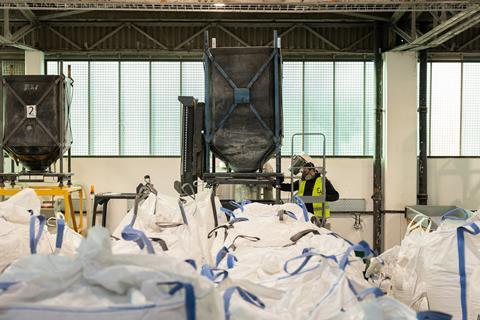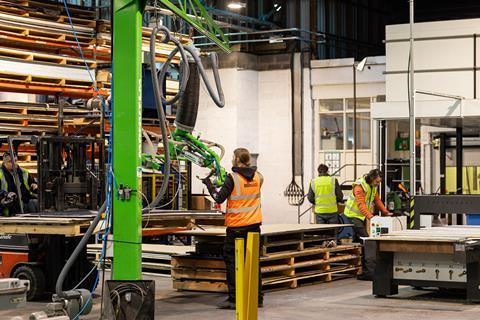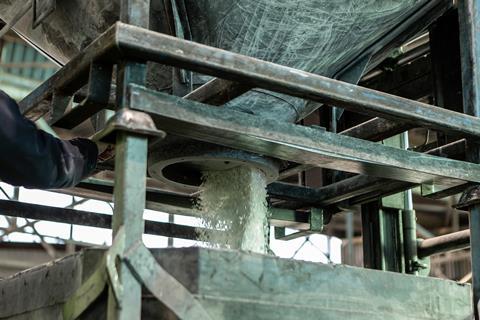Recycled-plastic manufacturer expands production with new Wales factory

Of the 400 million tonnes of plastic that the world produces every year, less than 10% is currently recycled.
From its base in Wales, Smile Plastics has been on a mission to change these numbers since 2015.
Originally founded in the 1990s, the manufacturer uses proprietary technology to transform plastic waste into 100% recycled, 100% recyclable plastic panels for architects and designers around the world.
Taking materials that would usually be consigned to landfill – everything from yoghurt pots to fridge freezers – the team selects and blends plastic waste to create functional architectural surfaces that can be used for a host of applications, from countertops and shower panels to furniture and signage.
Until recently, the company was converting around 500 tonnes of plastic waste into circular products – the equivalent of 62.5 million 500ml single-use bottles. Now, thanks to a move to a larger factory close to Swansea on the Gower Peninsula, Smile Plastics has increased its production capacity, and now has the potential to divert up to 3,000 tonnes annually – converting up to 70 tonnes of 100% recycled material every seven days.

Capacity was not the only consideration behind the move. Smile Plastics’ relationship with south Wales has always been central to the business, and the company was determined to maintain its local talent, community and supply chains through the move. #
Adam Fairweather, director at Smile Plastics, said: “The fact that the Gower Peninsula was the first area of outstanding natural beauty in the UK aligns perfectly with our company’s values. Beauty drives our creative direction, yet waste – especially plastic – is a scourge on the landscape and our environmental wellbeing. To maintain the landscape, we as a society must address our waste disposal and processing. If we as a company can highlight the desirability of recycling plastic not only in practice but also in the aesthetics and performance of the results we can deliver, we can nudge the dial closer to solving the problem of plastic, and permanently change the way we think about waste.”
Since its technology was developed in the 1990s, Smile Plastics has led the sector in the drive towards a circular economy and hopes to provide a template for low-energy, waste-efficient manufacturing. The move to a larger facility – in what was once Wales’ biggest chocolate factory – has opened up the space and resources necessary to optimise process efficiency, enabling the company to turn around larger orders within shorter timeframes.
The new factory diverts plastic waste from more than 60 local businesses around Swansea and beyond, and works in partnership with community groups and organisations including Cwm Environmental and Swansea Environmental Centre, to source raw materials and tackle specific waste streams.

Plastics are sorted and graded by colour and polymer type, then shredded, heated and pressed into sheets. The type and colour of raw materials determines the pattern of the finished panel.
As well as being recycled, products are also designed to be fully recyclable. Used panels can be returned to the beginning of the process, as can any waste plastics or substandard materials generated during manufacture and cutting. The company operates a buy-back service to facilitate return and recycling, making the panels especially well suited to temporary uses in events and exhibitions
Products are based on two material types – high impact polystyrene and polyethylene terephthalate – both of which have publicly available Environmental Product Declarations.
The company also holds ISO 14001 accreditation, reflecting its continuing commitment to responsible waste management. According to the manufacturer, to ensure health and wellbeing of people and the planet, all “at risk” waste material is tested for Persistent Organic Pollutants, which enables Smile Plastics to operate within REACH compliance.
In addition, the matt factory finish applied to Smile Plastics products requires no sanding or polishing, which greatly reduces the potential for microplastics pollution at factory level.


























No comments yet